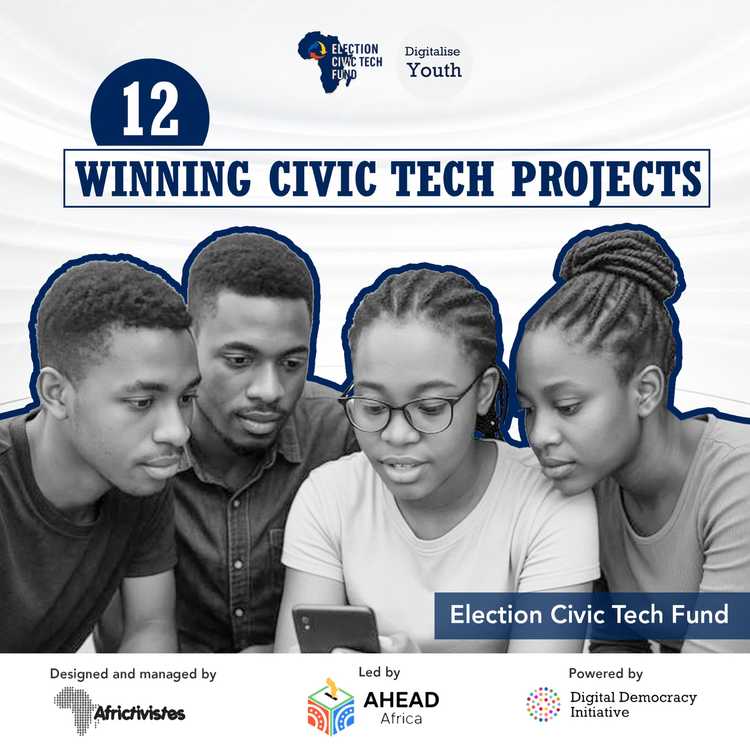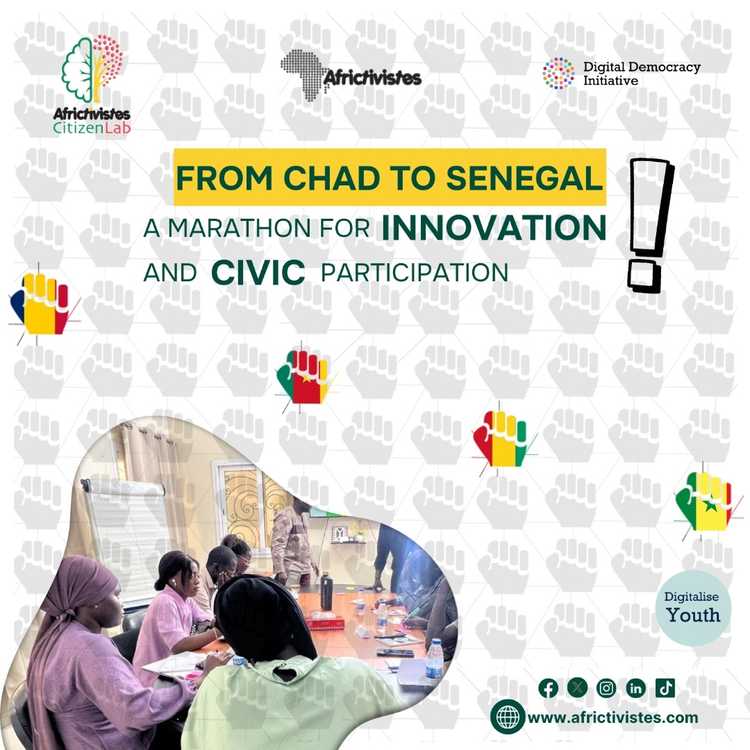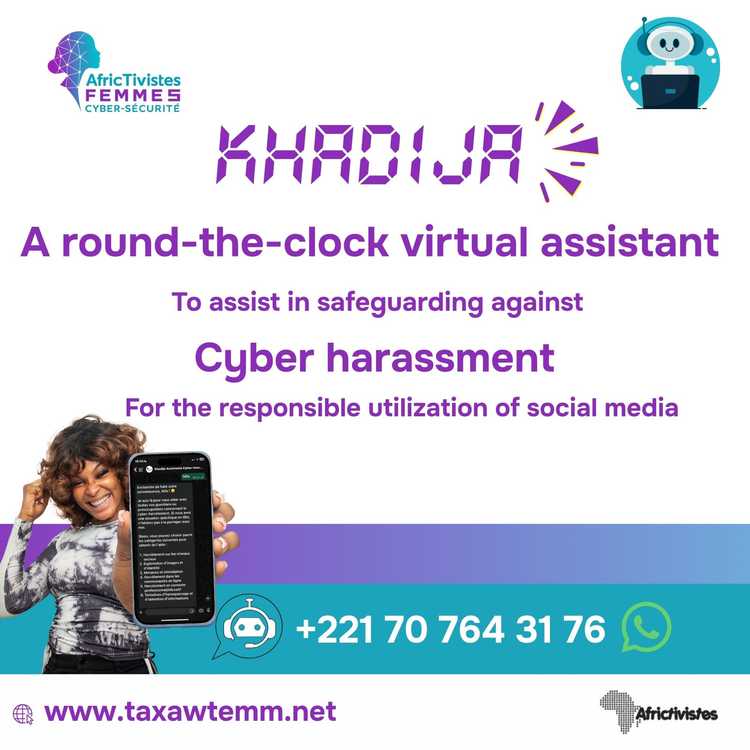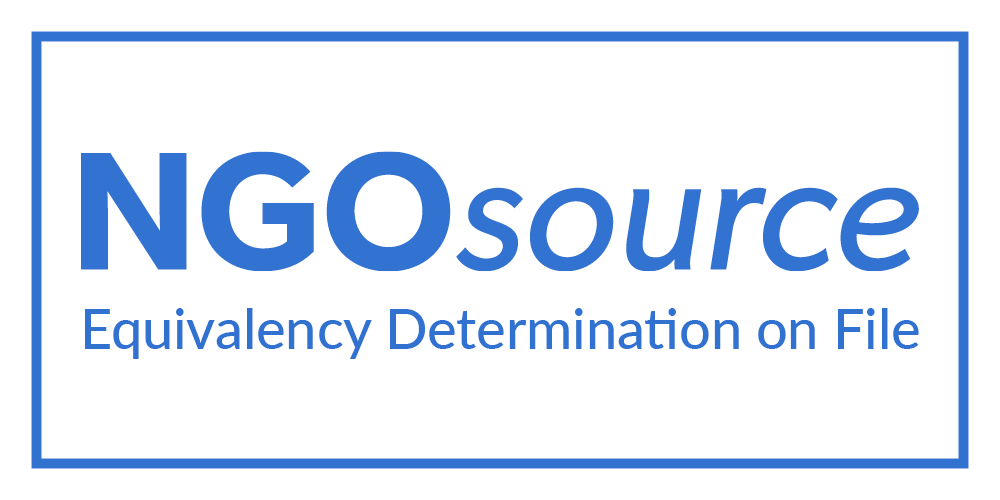AfricTivistes launches #TaxawTemm campaign for sensible use of social networks
On Thursday, August 11, AfricTivistes officially launched the two-month #TaxawTemm! Aar Suñu Bopp campaign on the proper use of social networks and the fight against online harassment, particularly against women.
The launch day began with a workshop for media professionals and bloggers, aimed at drafting a Good Practice Guide on cyber-harassment. This was followed by a sharing of best practices in the face of online violence during the official ceremony with various ecosystem and human rights stakeholders in attendance.
Kick-off of the #TaxawTemm! Aar Suñu Bopp campaign
Marking the official launch of the #TaxawTemm! Aar Sunu Bopp campaign, the afternoon panel provided an opportunity to discuss and share best practices in the face of online violence, with a view to defining the campaign’s main thrusts.
The official ceremony was attended by Adama Sow, Director of Communications and Public Relations at the Commission de Protection des Données Personnelles (CDP), Aminata Fall Niang, President of the Association des Juristes Sénégalaises (AJS), and Adjutant Serigne Fallou Athie of the Cybercrime Special Division, the Head of Gender Institutionalization at the Ministry of Women, Family and Child Protection, Ramatoulaye Touré, journalist Jaly Badiane and actress Ndiaye Ciré Ba, among other key players.
“AfricTivistes launched this campaign to encourage sensible use of social media, and at the same time fight against online violence, especially harassment of girls and women,” said Aisha Dabo, the organisation’s Programmes Coordinator, as she read President Cheikh Fall’s opening speech.
“We are also conducting this campaign to help reduce this nuisance, the repercussions of which are likely above all to limit the full participation of girls and women in the country’s development”, she assured.
Faced with the multiple forms of cyberbullying, such as the violation of fundamental rights and freedoms, the right to respect one’s image, the violation of privacy, the attack on a person’s dignity and honour, among other rights guaranteed by the Senegalese Constitution and the Declaration of Human Rights, Aminata Fall Niang said, adding that awareness is the first step.
Awareness on the part of both victims and perpetrators. “At AJS, we’ve seen many cases of violence. Generally speaking, the problem is that victims don’t necessarily know what to do in the event of cyber harassment; they’re helpless,” she confided, insisting on raising awareness of the different forms that cyber harassment can take, to enable victims to be better prepared.
“The Personal Data Protection Commission (CDP) is a means of protecting oneself in the event of cyberbullying,” Emmanuel Diokh reported on the issue of protection. “The victim can do so either by sending an e-mail, a petition or by lodging a complaint with the Special Cybercrime Division (DSC)”, he added, noting that these entities are daily overwhelmed by an excessive number of complaints.
Adama Sow, Director of Communications and Public Relations at the CDP, revealed that, in the face of these widespread online issues, the CDP and the DSC have no hesitation in collaborating in their joint mission to protect people and their property in cyberspace.
Adjudant Serigne Fallou Athie, representing Commissaire Aly Kandé of the National Police’s cybercrime squad, said: “We’re overwhelmed by the number of complaints we receive seven days a week”, he stressed, assuring everyone of the promptness with which the Special Division of Cybercrime resolves these “cases”, in all their diversity.
In addition, Aminata Fall Niang called for a strengthening of the legal framework through the production of a single, specific law that would bring together all the provisions scattered across several texts to provide an effective response to cyber harassment.
Workshop with information stakeholders to combat cyberbullying
At the morning workshop, participants discussed the definition of cyberharassment, a “serious societal problem” for which 65% of victims are aged between 16 and 35, and 70% of victims in Senegal are female”, said Aisha Dabo, Programmes Coordinator at AfricTivistes. “Cyberbullying is a form of violence exerted on a person in cyberspace”, was the definition adopted at the end of lively debates by participants in the expert-facilitated working session.
The workshop produced a shared narrative that will feed into the Good Practices Guide to combat cyberbullying, which will be disseminated once it has been validated by participants at the launch workshop in the coming days. They also pledged to get involved “in informing and raising public awareness to combat this scourge” as part of their work.
Taxaw Temm is the third component of the AfricTivistes Femmes Cybersécurité project in collaboration with Internews. The programme has been equipping women journalists and civil society players from Senegal and the Democratic Republic of Congo in digital security and safety, anti-harassment and digital auditing of organisations since December 2022.
During the morning workshop, participants discussed the definition of cyberbullying, a “serious societal problem” for which 65% of victims are aged between 16 and 35, and 70% of victims in Senegal are female”, explained Aisha Dabo, Programmes Coordinator at AfricTivistes. “Cyberbullying is a form of violence exerted on a person in cyberspace”, was the definition adopted at the end of impassioned debates by participants in the working session facilitated by the experts.
Earlier, digital entrepreneur Inssa Touré, a specialist in practical advice on AI and cyber-harassment, had described the scourge in the following terms: “Any practice aimed at harming an individual using cyberspace”.
For Emmanuel Diokh, a specialist in cyberspace law who came to share his expertise on digital law and user protection, the definition must cover not only “violence committed via messaging and social networks in particular, but also that which can occur with connected objects”, he argued in the presence of journalists, bloggers and IT professionals.
Workshop participants identified several causes of cyberbullying. Unemployment, misogyny, impunity, anonymity and morality were some of the reasons put forward by participants to explain the attitude of perpetrators of online violence against women and girls in general.
For Inssa Touré, beyond the socio-political context, trends or the quest for publicity on social media, the main reason is the weakness of legal provisions. “We need prosecution mechanisms and a stronger legal framework”, he pleads, while calling for the promotion of “digital literacy” to combat cyberbullying, but above all to prepare for the new threats generated by the advent and rise of artificial intelligence (AI).
In his view, with these technologies evolving at a rapid pace, identity theft and “Deep Fake” could soon become commonplace. He added that this approach could prepare young people to better apprehend the digital ecosystem with all that it entails.
To deal with cyberharassment, the participants recommended, among other things :
– Updating regulations to establish cyberbullying as a criminal offence
– Raising Internet users’ awareness and introducing the young to the Internet,
– Personal initiative to protect oneself via privacy and security settings.
As a result, the working groups were able to identify strategies for combating cyberbullying, which will be set out in detail in the Guide to Best Practices, based on three (03) entry points: Information, Sensitisation and Advocacy.
To effectively combat cyberbullying, participants selected the actors to be involved in the fight. The selection was based on the actors’ level of influence. The working groups chose, among others, the media, opinion leaders, community leaders, actors, influencers, etc.
The workshop produced a collective narrative that will feed into the Good Practices Guide to combat cyber-harassment, which will be disseminated once it has been validated in the coming days by the participants at this launch workshop. They also pledged to get involved “in informing and raising public awareness to combat this scourge” as part of their work.
Taxaw Temm is the third component of the AfricTivistes Femmes Cybersécurité project in collaboration with Internews. The project has been providing women journalists and civil society players from Senegal and the Democratic Republic of Congo with training in digital security and safety, anti-harassment measures and digital auditing of organisations since December 2022.

![[Gabon] AfricTivistes Sound the alarm amid Social Media suspension !](/static/1af016eb97c732e871a7c2fe79a60730/9e635/CREA-visuel-rapide-.jpg)
![[SENEGAL] AfricTivistes strongly condemns the brutal repression of students at Cheikh Anta Diop University in Dakar!](/static/29c233858b9d650cc77d87f75d4d2b56/9e635/Ucad-Senegal.jpg)



![[Guinea-Bissau]: Joint Statement from Human Rights Defenders Against the Confiscation of Popular Will !](/static/8552596543d1c00bc73e662f85c0a62f/fce2a/Capture-decran-2025-12-01-a-16.34.43.png)
![[Guinée-Bissau] Joint Declaration – Afrikajom Center and AfricTivistes both firmly condemn the military takeover and warn of the risk of a political crisis !](/static/4d5ad12346b3ef8c55278621c445488b/9e635/Putsch-Guinee-2.jpg)

![[Tanzanie] 🇹🇿 AfricTivistes strongly condemns violent suppression in Tanzania](/static/adf91a1c13cd101f988b6b6971928880/9e635/TZN.jpg)
![[Cameroon] AfricTivistes condemns violent repression, urges govt to uphold rights !](/static/6399a9d8e94e3ae1f681f86178520d96/9e635/WhatsApp-Image-2025-10-27-at-15.32.48.jpg)



![[Madagascar] Generation Z, the driving force of civic awakening!](/static/9072e289fdab44c062096dcfb9499441/9e635/4-2.jpg)






